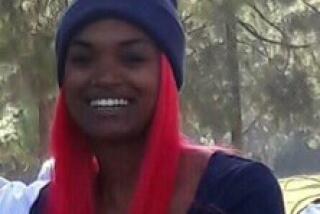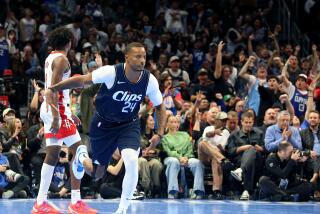Rough Recreation : Basketball Player Crosses Line in Municipal Gym Assault Case
Chauncey Powell was convicted Friday afternoon. He won’t be sentenced for another two weeks. His crime? Misdemeanor battery--assaulting a referee in a basketball game.
A friend of Powell’s, who asked not to be quoted by name, said the kind of thing that happened to Powell--and to referee Barry Alman--happens all the time in the city’s Municipal Gymnasium, which is to Balboa Park what concrete playgrounds are to Brooklyn.
“Muni” is where San Diego’s version of “the city game”--basketball in its rawest, most elemental form--is played daily, almost around the clock.
Bruce Moore, 35, hails from Baltimore. He plays at Muni almost every day.
“A lot of guys come on the court angry,” he said of the Muni faithful. “They act like it’s the NBA finals. You don’t have refs in pickup games, so whoever’s got the biggest mouth usually wins the battle.”
Game of Survival
Friday afternoon, Moore had just bowed out. A few feet away, the raucous game continued. The court was a cacophony of pushing, shoving, cursing--no semblance of teamwork here. This is basketball as conceived by Darwin--survival of the loudest and bare-chested fittest.
“What I don’t like here is the intensity,” Moore said. “It gets a little scary sometimes. I once saw a guy have his head stomped in. He looked to be unconscious after he hit the ground, but this guy kept kicking his head in anyway. I got the hell out of here that day. It can get rough around here.”
“This place is 31 flavors,” said Jeffrey J. Turner, who runs Muni for the City of San Diego, which owns and operates the 50-year-old facility, next to the Aerospace Museum.
Turner said it’s no secret that Muni’s brand of basketball is rough, tough stuff. Turner said his job is to make sure “the city has no liability for anything happening out there.” He looked out the window of his upstairs office like a warden eyeing the inmates.
Turner conceded that league games at night--pitting as many as 58 teams--are often gruelingly intense. Fights, as brutal as the one Moore alluded to, are said to be common.
“The potential for violence is always here,” Turner said. “The games can become quite volatile at times. Emotions run high. The guys out there sometimes lose sight of these being recreational games, designed for fun. Some of these guys act like basketball is their only claim to fame, and ain’t nobody gonna (mess) with that.”
Altercations had been happening with disturbing regularity on the night that Chauncey Powell chased Barry Alman. Turner was on duty the night of the Alman-Powell bout, but said he witnessed only the aftermath, which he described as “wild, chaotic . . . People were leavin’ like crazy.”
Alman, 37, is originally from Boston. He has lived in San Diego since 1979 but has worked as a referee since 1971. He currently runs the Tri-Cities Metro Officials Assn., refereeing high school and college games as well as league games at Muni and other venues. He said such experience has given him a cool head for life, but particularly for the flare-ups of urban hoops.
Powell said in court Friday that nothing could be further from the truth.
He called Alman a “hothead” who provokes players. Powell said he was provoked in what many call one of Muni’s all-time worst incidents, one that even Powell teammate Zackery King told the judge got “way out of hand.”
It happened on the night of Sept. 29, 1987. Powell’s team, the San Diego All-Stars, was late for a game. Tempers had flared in matches earlier that evening, refereed by Alman.
Alman testified this week, before Municipal Court Judge Rafael Arreola, that tension ignited when Powell was assessed a technical foul. Powell made a layup but protested--loudly, profanely--that he was fouled. When the call didn’t come, Alman said, Powell tossed the ball into a corner in disgust.
Alman dished out another technical to Powell’s team when one of his teammates charged the opponents’ bench and, according to testimony, said, “I’m going to get you.”
Alman said the game proceeded normally for seven or eight minutes until Powell made another layup and was fouled--a call Alman made. A player on the other team cursed Alman in lodging a protest. Powell complained, charging that Alman should have been more impartial and should have given that player a technical as well.
Both parties agree that a grim fracas ensued, with Alman and Powell arguing wildly. Alman claimed never to have touched Powell. Powell claimed Alman threw a basketball, striking him in the face.
Alman said he was hit repeatedly in the face and eyes by Powell, who chased him across the court, screaming at him. He ran to the scorers’ table “to find refuge.” He said Powell attempted to dislodge an electronic scorer from the scorer’s table. When it wouldn’t budge, Powell resumed chase--as Alman testified, the length of the court. Once he was caught, he said, he was struck repeatedly in the chest and back.
Alman said he suffered 17 stitches above the eye, four around the cheekbone, with bruises dotting his back and neck. He said he called police, but by the time they arrived 35 minutes later, Powell and his friends had gone. Alman decided to press charges.
In leaving the courtroom Friday afternoon, Powell laughed and joked with teammates--five of whom testified on his behalf, saying he was provoked, that Alman did throw the basketball, striking him in the face and precipitating what they called “self-defense.”
Powell said later in an interview, “I tell you, I’m not guilty,” adding with a smile, “Hey, I beat him up good. I don’t take nothin’ like a guy throwin’ a ball in my face. No way, man. He’s just a little guy who could never play basketball, so he’s mad.”
Deputy City Atty. Patricia Atwill, who prosecuted Powell for the City of San Diego, said Judge Arreola never believed Alman threw the ball.
“And even if he had,” Atwill said, “he believed the defendant used unnecessary force.”
Atwill said the maximum sentence Powell could receive is six months in jail and a $1,000 fine. He’ll get “nowhere near” such a sentence, she said, adding that probation was more likely.
Rough Place to Play
Cory Dunkirk, scorekeeper on the night of the fight, testified Friday on Alman’s behalf. He called Muni an increasingly rough place to play, despite efforts “to clean the joint up.” He agreed to testify, he said, believing that Powell’s attack of Alman was akin to a policeman being assaulted or shot.
“When I came to San Diego six years ago, Muni was a legend--but not the place to go,” Dunkirk said in an interview. “I was told there was lots of fights, lots of B.S. I heard right. The place is just too rough.”
Dunkirk said he tried to “improve the image” in a brief stint as director of the San Diego Basketball Assn., which oversees league games. He has since resigned the post, saying that Muni has “reverted to form.”
Even supervisor Turner conceded that professional players who once came to the barn-like gym--Bill Walton, Phil Smith, Michael Cage--now seek courts in other parts of town.
“More low-key places,” Turner said. “The action here can get kind of stressful.”
Steve Caldwell, one of Powell’s teammates on the San Diego All-Stars, said his team had won Muni championships 4 years running and that Alman simply tired of policing the dominance of a dynasty.
“Just to show you how nothing that happens at Muni makes any sense,” he said, “do you know what Cory and Alman gave to us as we left the courtroom? An application form for the new season beginning in March. I guess they wanted to kill two birds with one stone--get the conviction but make sure we signed up early.”
More to Read
Go beyond the scoreboard
Get the latest on L.A.'s teams in the daily Sports Report newsletter.
You may occasionally receive promotional content from the Los Angeles Times.










